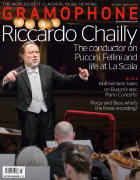Texte paru dans: / Appeared in: |
|
 |
Outil de traduction (Très approximatif) |
|
Reviewer: Tim Ashley First performed in Rome in 1724, Il Giustino is among the most beautiful and cogent of Vivaldi’s operas. Using a libretto by Niccolò Beregan that was also set by Albinoni and Handel, it deals, loosely and somewhat fancifully, with the rise to power of the sixth-century Byzantine emperor Justin I, who began life as a ploughman before embarking on the successful military career that brought him to the attention of the imperial authorities. Like many Baroque operas, the work is structured after the fashion of a Renaissance epic, in which the erotic and the political repeatedly intersect and supernatural powers govern the lives of men. Watched over by the goddess Fortuna, the heroic Giustino saves the life of the emperor Anastasio’s sister Leocasta when she is attacked by a bear, and is subsequently sent to Constantinople, where he becomes the protagonist of a series of interlocking narratives that expose the empire as being threatened both from without (by the tyrannical Vitaliano, who is obsessively in love with Anastasio’s wife Arianna) and within (Anastastio’s duplicitous general Amanzio, who wants the imperial throne for himself). Though intricate, the complex web of plots and counterplots is carefully laid out and resolved, with none of the prolixity that hampers some of Vivaldi’s operas. In a booklet note for his new recording, Ottavio Dantone argues for the dramatic validity of Vivaldi’s operas in general, and backs up his case with a performance of fiery energy and tremendous élan. The score is part pasticcio (‘Spring’ from The Four Seasons ushers in Fortuna’s appearance on the scene), but the work is so much more than a collection of bravura arias, and Dantone finds a strong sense of unity and purpose within it. Rhythms are crisp and incisive, textures sensuous and often startlingly immediate. There’s plenty of swagger and bravado in the Accademia Bizantina’s playing, and some superb obbligatos, particularly the psaltery, exquisitely played by Margit Übellacker, which accompanies Giustino’s beautiful monologue at the close of the second act. Recitatives, meanwhile, are sharply characterised and seamlessly integrated with the arias, the latter thrillingly done. Delphine Galou, smoky in tone and wonderfully secure over the role’s colossal range, really makes us believe in Giustino’s innate nobility and moral integrity. Silke Gäng’s warm mezzo and Emo˝ke Baráth’s silvery soprano blend beautifully together in the duets for Anastasio and Arianna. Baráth sounds ravishing in her arias. Gäng, mindful that the much-recorded ‘Vedrò con mio diletto’ expresses the thoughts of a man on the eve of battle, sings it with striking urgency, where most interpreters are apt to be reflective. As Vitaliano, meanwhile, Emiliano Gonzalez Toro, with his spectacular coloratura, is little short of sensational. Arianna Vendittelli captures Amanzio’s deceitful, Iago-like charm to perfection, while Verónica Cangemi makes a coolly sensual Leocasta. My only qualm, albeit minor, concerns Alessandro Giangrande, who plays Vitaliano’s brother Andronico as a countertenor but sings his sidekick Polidarte as a tenor: he sounds somewhat more comfortable as the latter. A handful of sound effects have been added to aid the dramatic tension: a roaring bear that hits the floor with a resounding thump when clobbered by Giustino; and a grunting sea monster that Vitaliano at one point conjures up to terrify Arianna. The whole thing is hugely enjoyable, consistently engaging and highly recommended. |
|




